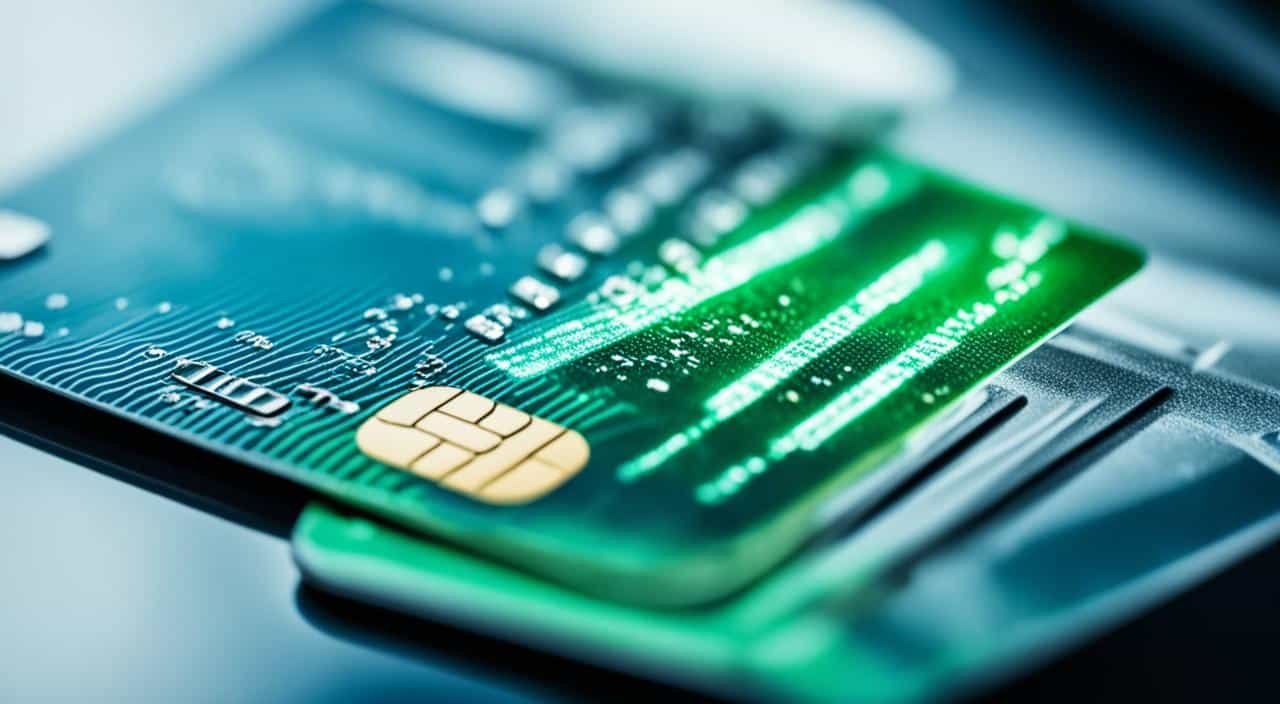Credit Card Scams: What You Need To Know
More people are using credit cards, especially online, which means more scams. Scammers target our comfort with online payments and our growing online sales. They also take advantage of more people using the Internet for financial dealings. Here are some common scams and tips to avoid them.
Key Takeaways
- Credit card scams are on the rise as more transactions move online.
- Scammers use various tactics like overcharging, interest rate reduction scams, and arrest phone call scams to steal personal and financial information.
- Donation scams and skimming devices at ATMs and gas stations are also common credit card fraud techniques.
- Regularly checking your credit card statements and credit report can help you identify and report any fraudulent activity.
- Taking proactive steps like enabling fraud alerts and locking your credit can protect you from becoming a victim of credit card fraud.
Common Types of Credit Card Scams
Credit card scams are many and aim to trick people into giving away their personal and financial info. Knowing about these scams can help you stay safe.
Overcharge Scams
Scammers might send an email, text, or call saying your credit card was overcharged. They ask you to give personal info to get a refund. This is a trick to steal your details.
Interest Rate Reduction Scams
Scammers may call you, saying they can lower your credit card interest rates. But, they really want your personal and financial info. This info can be used for identity theft and fraud.
Arrest Phone Call Scams
Another scam is the “arrest phone call” scam. You get a call saying you’re arrested for not paying credit card bills. They ask for money or personal info to stop legal action. This is a scam.
Knowing about these scams helps you protect your money and info. Always check if requests for info are real. Don’t give out personal or financial details unless you called them first.
Donation Scams and Skimming
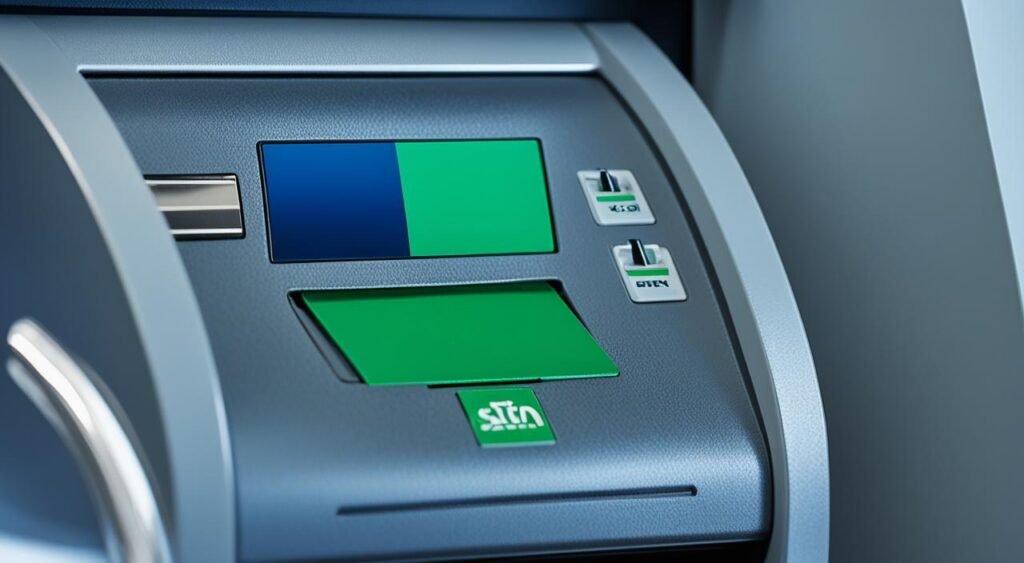
In the world of credit card scams, two schemes stand out: donation scams and skimming. Donations scams trick people by pretending to be charity reps. They ask for credit card information over the phone, saying it’s for charity. But, these calls are often from fraudsters who want your personal information and credit or debit card details for bad reasons.
Skimming is another trick used by credit card fraudsters. They attach a small device, called a skimmer, to credit card readers at ATMs or stores. This device grabs your card details and PIN, letting scammers make fake transactions or create counterfeit cards. Always check the credit card readers for any oddities when you use your card in public.
To avoid these scams and fraud, be cautious of calls asking for credit card information without your say-so. Always check credit card readers for any signs of tampering. Also, keep an eye on your credit card statements and credit reports for any strange activity. If you spot something wrong, report it to your card issuer right away.
| Type of Scam | Description | How to Avoid |
|---|---|---|
| Donation Scams | Scammers pose as representatives of charitable organizations and solicit credit card information over the phone, promising to use the funds for a good cause. | Be wary of unsolicited calls requesting credit card information. Verify the legitimacy of the organization before providing any personal or financial details. |
| Skimming | Fraudsters install small electronic devices, known as skimmers, on credit card readers at ATMs or retail locations to capture card details and PINs. | Inspect credit card readers for any signs of tampering before using them. Monitor your credit card statements and credit reports regularly for any unauthorized activity. |
By staying informed and taking steps to protect yourself from credit card fraud, you can lower your risk of falling victim to these scams and fraudulent activities.
What Is Credit Card Fraud?
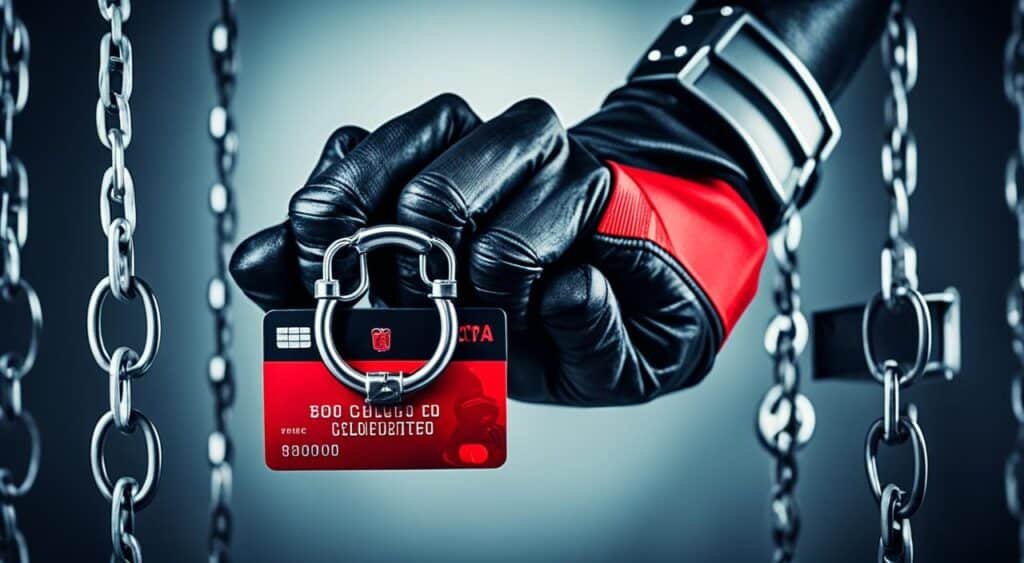
Credit card fraud is a big problem that can really hurt victims. It means using a credit or debit card without permission to buy things, take cash, or get other benefits. This can happen if someone steals your card, gets your card number and info, or uses your details without you knowing.
Types of Credit Card Fraud
There are many kinds of credit card fraud people should know about:
- Account Takeover Fraud: This is when a thief gets into your credit card account and makes unauthorized buys.
- Application Fraud: Someone uses your info to open a new credit card in your name without you knowing.
- Lost or Stolen Card Fraud: If your card is lost or stolen, a thief can buy things with it.
- Card-Not-Present Fraud: This is when someone buys things online, over the phone, or by mail using your card details without the card itself.
- Skimming: Thieves put a hidden device on ATMs or card readers to steal your card info.
It’s key to watch your credit reports and account statements for any odd activity. Reporting fraud quickly can lessen the harm and protect your money.
How Does Credit Card Fraud Happen?

Credit card fraud is a big worry for many people today. Criminals use different ways to steal personal info and use credit card weaknesses. Knowing how fraud happens helps protect you from it.
Skimming is a common trick used by fraudsters. They put a small device on card readers at ATMs or gas stations. This device grabs the card’s magnetic stripe data and PIN. Then, they make fake cards and buy things without permission.
Phishing is another trick. Scammers send fake emails or texts that look like they’re from real credit card companies. They ask for your card details, personal info, or login info. This info lets them get into your accounts.
- Stealing credit cards from wallets, purses, or mailboxes can also cause fraud.
- Hackers might break into credit card companies or merchants’ systems to get customer info.
- Some crooks use stolen info to open new accounts or buy things in your name.
It’s important to be careful and protect your credit card info. Knowing how scammers work helps you keep your money safe.
Identifying Credit Card Fraud
It’s vital to keep an eye on your credit card statements and credit reports. This helps you spot any suspicious activity or fraudulent charges early. By doing so, you can limit the damage from credit card fraud.
Check Statements and Credit Reports
Looking over your credit card statements every month is key to spotting fraud. Make sure to check each transaction for anything you don’t recognize. If you find anything odd, call your credit card company right away.
Also, check your credit reports often for any accounts or inquiries you didn’t make. These could be signs of identity theft or fraud.
Don’t Ignore Debt Collectors
If you get calls from debt collectors about accounts you don’t know, it means someone has used your info. Don’t ignore these calls. Call the credit card companies and credit bureaus to dispute any fake accounts or charges.
By staying alert and checking your credit card statements and reports often, you can catch fraud quickly. This protects your money and your credit history.
Zero Liability Protection
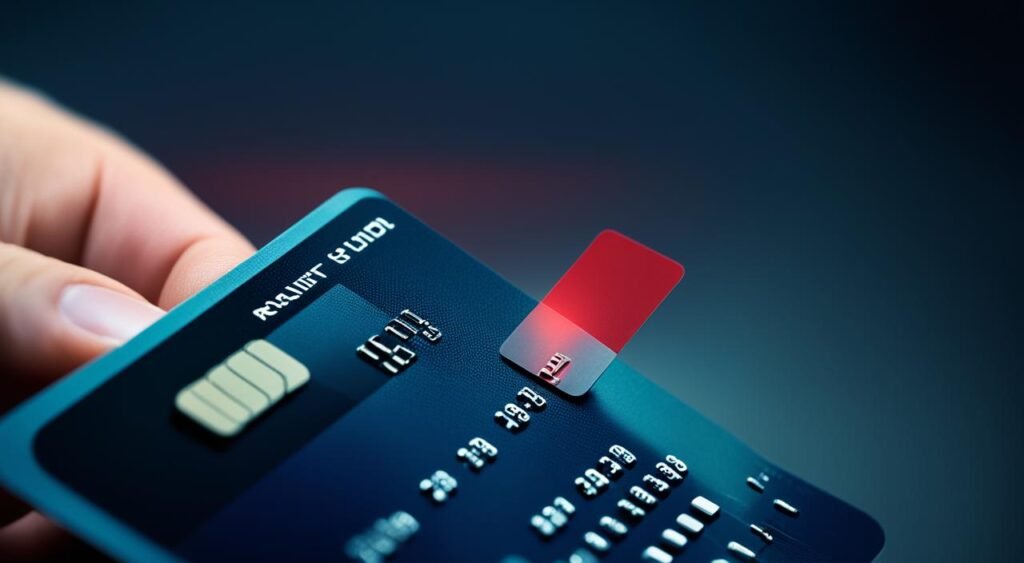
Credit card fraud can be a big worry, but zero liability protection helps a lot. Many credit card companies offer this feature. It means you won’t have to pay for charges that weren’t made by you.
If your card is stolen or used without your okay, you won’t be responsible for the charges. You just need to tell your credit card company quickly. This way, you won’t lose any money because of the fraud.
The Fair Credit Billing Act also helps by limiting your liability to just $50. But with zero liability protection, you don’t even have to pay that $50. So, you won’t lose any money if someone uses your card without permission.
It’s important to watch your credit card statements and credit reports for anything that looks wrong. If you see charges you didn’t make, tell your credit card company right away. This helps stop more damage and keeps you from paying for the thief’s mistakes.
| Credit Card Issuer | Zero Liability Protection |
|---|---|
| Visa | ✓ |
| Mastercard | ✓ |
| American Express | ✓ |
| Discover | ✓ |
Knowing about your credit card’s protections can help you stay safe from fraud. Always be careful and report any strange charges fast. This way, you can use zero liability protection and avoid the bad effects of fraud.
Steps to Take If Victimized
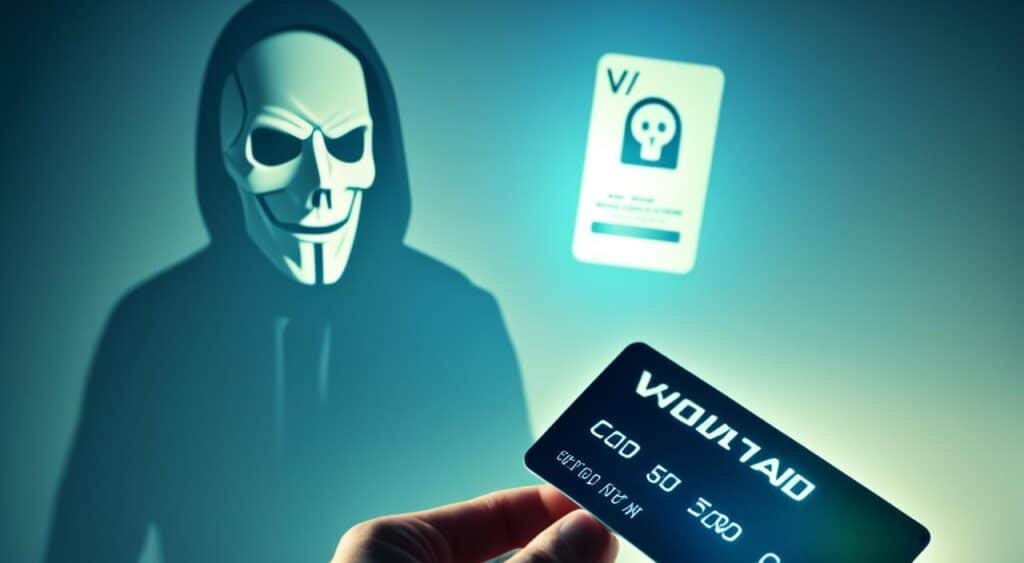
If you think you’ve fallen victim to credit card fraud, act fast to lessen the damage. Here are the main steps to follow:
Notify Lender and Authorities
Start by contacting your credit card company right away. Tell them about the credit card fraud and ask them to close the affected accounts. They should also give you new credit or debit cards. Also, file a report with the local authorities and the Federal Trade Commission (FTC) to record the incident.
Lock Accounts and Credit Reports
To stop more fraudulent activities, put a freeze on your credit reports with Experian, Equifax, and TransUnion. This makes your credit report hard to access and stops new accounts from being opened in your name. Also, keep a close eye on your credit and set up alerts on your credit reports for any odd activity.
By acting quickly, you can lessen the effects of credit card fraud. The sooner you act, the less damage you’ll face. This helps you take back control of your credit card accounts and personal information.
Credit Card Scams: Prevention Tips
It’s important to protect yourself from credit card scams and fraud today. By taking steps ahead of time, you can keep your personal info and money safe. Here are some tips to help you avoid credit card scams:
- Check your credit reports and account statements often for anything odd. If you see unauthorized charges or signs of identity theft, tell your credit card company right away.
- Think twice before sharing your credit card info or personal details over the phone, email, or online. Real companies won’t ask for this without a good reason.
- Don’t fall for scams that try to rush you or offer deals that sound too good to be true. This includes scams about lowering interest rates or overcharging you.
- Keep your credit or debit card safe by storing it in a secure spot and being careful when you use it.
- Always check your credit card statements for any charges you didn’t make or strange activities. Tell your credit card company about these right away.
Following these tips can greatly lower your chances of falling victim to credit card fraud. This helps keep your financial health safe.
“The best defense against credit card scams is to be proactive and vigilant in protecting your personal and financial information.”
It’s key to stay updated and take steps to protect your credit card and personal info. This helps you avoid the problems that come with credit card scams and fraud call registry.
Also Read: What Are The Different Types Of Credit And Why Do They Matter?
Conclusion
Staying alert is key in the world of credit card scams and fraud. Criminals keep finding new ways to steal your personal and financial info. Knowing about scams like overcharge, interest rate reduction, and arrest phone call scams helps protect you.
It’s important to check your credit card statements and credit reports often. Use secure ways to pay and report any strange activity to your card company and the police right away. Being up to date on fraud tactics and taking steps to avoid scams keeps your credit card info and personal data safe.
Credit card scams and fraud can lead to big financial losses and even identity theft. By being careful, learning about the latest threats, and taking steps to protect yourself, you can lower the chance of getting scammed. This helps keep your financial health safe.
FAQs
Q: What are some common credit card scams to watch out for?
A: Some common credit card scams include phishing scams, imposter scams, card skimmers at gas pumps, and fraudsters asking for your credit card details over the phone or email.
Q: How can I protect myself from credit card scams?
A: To protect yourself from credit card scams, avoid sharing your credit card number or sensitive information, be cautious of unknown websites requesting your credit card details, and regularly monitor your credit card activity for any unauthorized transactions.
Q: What should I do if I become a victim of a credit card scam?
A: If you become a victim of a credit card scam, report the fraud to your credit card issuer immediately, place a fraud alert on your credit accounts, and consider checking your credit report for any suspicious activity.
Q: How can I avoid becoming a victim of a credit card scam?
A: You can avoid becoming a victim of a credit card scam by being cautious of providing your credit card information to unknown sources, not sharing your credit card number to make payments over insecure channels, and staying informed about common credit card scams and how to avoid them.
Q: What steps should I take to report credit card fraud?
A: To report credit card fraud, contact your credit card issuer immediately, inform them of the unauthorized transactions, and follow their guidance on next steps such as cancelling your card, disputing charges, and placing a fraud alert on your account.
Q: How can I recognize phishing scams targeting my credit card information?
A: Phishing scams targeting credit card information often involve fraudulent emails or websites posing as legitimate companies, requesting your credit card details, passwords, or personal information. Be cautious of such emails and websites and avoid clicking on any suspicious links.
Q: What are some red flags of credit card scams and how to avoid them?
A: Some red flags of credit card scams include unsolicited requests for your credit card number, promises of extravagant rewards for sharing your credit card details, and pressure tactics to provide your credit card information urgently. To avoid falling for such scams, verify the legitimacy of the request and refrain from sharing sensitive information.
Source Links
- https://www.brex.com/resources/what-is-credit-card-fraud
- https://www.forbes.com/advisor/credit-cards/credit-card-scams-and-how-to-avoid-them/
- https://www.experian.com/blogs/ask-experian/credit-education/preventing-fraud/credit-card-fraud-what-to-do-if-you-are-a-victim/
